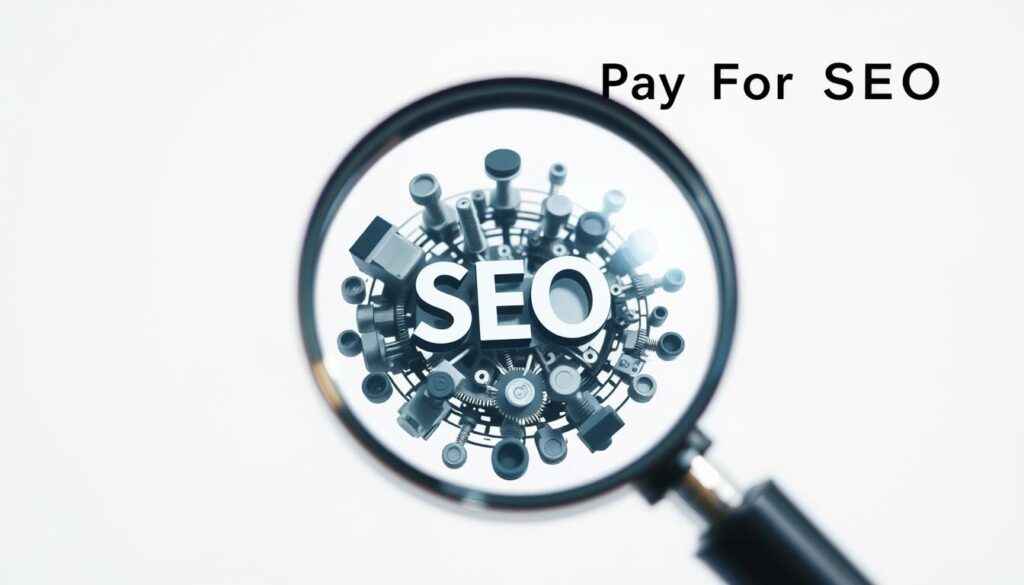Ever wondered why some small businesses thrive while others struggle? It’s all about effective marketing. This guide covers everything you need to know about marketing for small businesses. You’ll learn about the basics and advanced digital marketing strategies.
Discover how to build a strong online presence and master SEO. Learn about content creation and marketing approaches that boost your business. These strategies can help your business grow locally and nationally.
Key Takeaways
- Understanding the integral role of marketing for small businesses in achieving growth.
- Exploring diverse marketing strategies for small businesses.
- The significance of digital marketing for small businesses in today’s market.
- How SEO can enhance visibility and drive customer engagement.
- Implementing effective content creation to attract and retain customers.
- The differences between local and national marketing for targeted outreach.
Understanding the Basics of Marketing for Small Businesses
Marketing is key for small businesses to grow and sell more. It’s about promoting products and services to potential buyers. To do well, you need to know what customers want, offer value, and talk to your audience well.
Small businesses have their own set of challenges. Their marketing should be creative and smart, using what they have. Using local networks and social media helps them reach more people.
Entrepreneurs can use simple marketing tips to grow. This includes making interesting content, sending emails, and joining local events. These steps help build a strong brand and keep customers coming back.
Small businesses need to pick marketing strategies that speak to their audience. Knowing the basics of marketing is the first step to connecting with customers. This makes sure every marketing effort is worth it and hits the mark.
| Strategy | Description | Benefits |
|---|---|---|
| Social Media Marketing | Engaging customers through platforms like Facebook, Instagram, and Twitter. | Cost-effective way to build brand loyalty and connect with a younger demographic. |
| Email Marketing | Sending targeted messages to customers and prospects to promote offers. | High ROI and direct communication with customers. |
| Content Marketing | Creating valuable content to attract and retain a target audience. | Enhances brand authority and aids in customer education. |
| Local SEO | Optimizing online presence for local search results. | Increases visibility among nearby customers looking for specific products or services. |
What is Marketing for Small Businesses?
Marketing for small businesses includes many activities to reach potential customers. These can be ads, promotions, public relations, and customer service.
A good marketing plan mixes different methods for small businesses. They use personal connections and networks to connect with their audience.
It’s important to know the special challenges and chances in marketing for small businesses. Each business has its own identity and what makes it special. This affects how they market themselves.
By staying active and planning well, small businesses can stand out. They can show off their products and services. They also work on keeping customers happy and loyal.
Key Marketing Strategies for Small Businesses
Effective marketing for small businesses starts with knowing their audience and what makes them special. This knowledge boosts customer interaction and drives sales. It’s key to define target audiences and create unique selling points for small businesses.
Defining Target Audiences
Knowing who to market to is crucial. Small businesses should use data like demographics and interests to understand their audience. This helps them create messages that speak directly to their customers’ needs.
Creating Unique Selling Propositions (USPs)
A strong unique selling proposition sets a business apart. It shows what makes a product or service stand out. A clear USP grabs attention and influences customer choices.
It also builds loyalty and recognition in a crowded market. A good USP shows the value of what you offer.
Digital Marketing for Small Businesses
In today’s digital world, small businesses must focus on their online presence. A strong online presence helps brands reach more people and build trust. This section looks at why online presence matters and the best digital marketing channels for growth.
Importance of Online Presence
An online presence lets small businesses show off their products and services anytime. A good website and active social media profiles help with customer interaction and promotions. This can lead to more loyal customers and repeat business.
Popular Digital Marketing Channels
To succeed in digital marketing, small businesses need to use the right channels. Different platforms are good for different marketing tasks, such as:
- Social Media Marketing: Using sites like Facebook, Instagram, and Twitter to connect with customers.
- Email Marketing: Sending personalized emails to customers to keep them engaged and informed.
- Content Marketing: Creating valuable content like blogs and videos to attract and keep an audience.
- Search Engine Marketing: Working to be seen in search engines, bringing in traffic through ads and organic searches.
| Digital Marketing Channel | Main Objective | Benefits |
|---|---|---|
| Social Media | Engagement and brand awareness | Increased customer loyalty and brand recognition |
| Email Marketing | Direct communication with customers | Higher conversion rates and customer retention |
| Content Marketing | Educate and attract customers | Establish authority and improve SEO |
| Search Engine Marketing | Drive targeted traffic | Immediate visibility and potential for high returns |
The Role of SEO in Small Business Marketing
Search Engine Optimization, or SEO, is key for small businesses. It helps them show up online better. By making their website better for search engines, they can reach more people. This means more people see what they offer.
What is SEO?
SEO for small businesses means making their website better for search engines. It’s about making content and website structure better. This way, they can attract people who are looking for what they sell. It helps them connect with the right people.
Benefits of SEO for Small Businesses
SEO helps small businesses in many ways. It makes them more visible and trusted. This leads to more people visiting their website and possibly buying from them. Here are some main benefits:
- Enhanced Visibility: Being higher in search results means more people see them.
- Cost-Effective Marketing: SEO is a smart investment that keeps giving back over time.
- Higher Conversion Rates: With the right traffic, they’re more likely to make a sale.
- User Experience Improvement: SEO makes websites better for users, keeping them engaged.
For small businesses, SEO is not just a good idea. It’s essential. Knowing how SEO works helps them stay ahead in the digital world.
| SEO Benefit | Description |
|---|---|
| Increased Visibility | Being higher in search results means more people see them. |
| Cost Efficiency | Long-term strategy that reduces expenses associated with paid advertising. |
| Improved Traffic | Higher organic traffic from users interested in products or services. |
| Enhanced User Experience | Streamlined website structure increases user satisfaction and engagement. |
Keyword Research for Small Business Marketing Success
Effective keyword research is key for small business marketing success. It helps attract the right customers and boost online visibility. Using the right tools makes this process easier and aligns with marketing goals.
Tools for Effective Keyword Research
Small businesses need various tools for deep keyword insights. Some top choices include:
- Google Keyword Planner: Great for finding new keywords and checking their popularity.
- SEMrush: Offers detailed keyword data and competitive analysis.
- Ahrefs: Helps evaluate keyword difficulty and track ranking changes.
These tools help analyze keyword performance and trends. This knowledge helps focus on the most relevant search terms. It drives more traffic to their websites.
Understanding Search Intent
It’s vital to understand search intent for creating relevant content. Each search query has a purpose. Knowing these motivations can greatly impact marketing strategies. There are three main types of search intent:
- Informational: Users seek specific information or answers.
- Navigational: Users aim to find a particular website or page.
- Transactional: Users are ready to buy or complete a transaction.
By targeting each type of search intent, small businesses can improve their content. This enhances user experience and boosts their search rankings.
Content Creation Strategies for Small Businesses
Creating effective content is key for small businesses to attract and keep customers. Good small business marketing content builds trust and connects with people. It makes your brand more authoritative.
Successful strategies include different types of content. This can be:
- Informative blog posts that teach about trends.
- How-to guides with practical tips.
- Videos that show off products or services.
- Social media posts that spark conversations.
Using SEO in your content helps more people find it. This makes sure your content is valuable and seen by the right people. Using the right keywords helps a lot.
Posting content regularly is also important. It keeps people coming back for more. By planning your content in advance, you can keep your online presence strong.
| Content Type | Purpose | Benefits |
|---|---|---|
| Blog Posts | Educate and inform | Improves SEO; establishes authority |
| How-to Guides | Provide step-by-step assistance | Increases trust; drives traffic |
| Videos | Showcase products/services | Higher engagement; shares easily |
| Social Media Posts | Encourage interaction | Builds community; immediate feedback |
Link Building Techniques for Small Business Growth Marketing
Link building is key for small businesses to grow online. It boosts visibility and marketing success. A good backlink strategy helps rank higher in search engines.
Importance of Backlinks
Backlinks are vital for SEO. They show content quality and relevance. They tell search engines you’re credible.
Getting quality backlinks from trusted sites boosts your authority. This leads to more website visitors, better conversion rates, and more customer trust.
Strategies for Building Quality Links
Creating effective link-building strategies is essential. Here are some ways to do it:
- Guest Blogging: Write for other reputable blogs to link back to your site.
- Partnerships: Work with other brands for link exchanges.
- Shareable Content: Make content like infographics or videos that others want to link to.
- Community Engagement: Join local groups to get backlinks from their sites.
| Strategy | Description | Expected Outcome |
|---|---|---|
| Guest Blogging | Write for other blogs in your niche. | More traffic and visibility through links. |
| Partnerships | Work with brands for link swaps. | Boost authority and reach new people. |
| Shareable Content | Make content like guides or infographics. | Get organic backlinks from interested people. |
| Community Engagement | Connect with local businesses for backlinks. | More local visibility and trust. |
Using these strategies, small businesses can build a strong link-building plan. This improves their online presence and supports long-term success online.
Local Marketing for Small Businesses
Local marketing is key for small businesses to attract nearby customers. It lets them focus on what their community likes and needs. This makes their marketing more effective.
Getting involved in local events and sponsoring activities are good ways to engage. Partnering with nearby groups also helps. These actions build trust and loyalty, leading to more customers.
For better visibility, optimizing for local SEO is essential. Claiming and optimizing Google My Business listings is a big step. Having correct business info makes it easy for people to find you.
Small businesses should also ask for customer reviews on Yelp and Google. Good reviews boost your online image. Responding to bad reviews shows you care about your customers.
Using targeted local ads, like social media or flyers, is also important. These methods help bring in more customers. They improve your brand and help your business grow in your area.
National Marketing for Small Businesses
National marketing is key for small businesses looking to grow beyond their local area. It’s different from local marketing, which focuses on a specific neighborhood or city. By understanding these differences, small businesses can choose the right strategy for their goals and audience.
Key Differences between Local and National Marketing
It’s important for small businesses to know the differences between local and national marketing. This knowledge helps them plan their marketing efforts effectively.
| Aspect | Local Marketing | National Marketing |
|---|---|---|
| Target Audience | Specific local community | Wider audience across the country |
| Approach | Community engagement and local events | Mass media campaigns and online advertising |
| Channels Used | Local newspapers, radio, community boards | Television, social media, national publications |
| Branding Strategy | Focus on locality and personal connections | Emphasis on broad brand visibility and recognition |
| Budget Allocation | Lower budget concentrated on local activities | Higher budget allowing for extensive campaigns across multiple channels |
These differences show the unique approaches needed for local and national marketing. By assessing their goals and resources, small businesses can make informed decisions about national marketing.
Conclusion
This guide has covered the wide world of marketing for small businesses. It showed how using digital, local, and SEO strategies can help them grow. Knowing these key points is crucial for small businesses to succeed.
Using online channels and SEO helps small businesses reach their audience better. As competition grows, using these strategies can help them stand out. This leads to lasting success.
Entrepreneurs looking to boost their marketing should consider getting help from experts like Revenue Boomers. They can guide through online marketing and improve search rankings. With the right strategy, small businesses can do well in a changing market.
FAQ
What is marketing for small businesses?
Marketing for small businesses includes many strategies to promote and sell products or services. It’s about knowing what customers want, building a brand, and talking to the right people.
How can small businesses utilize digital marketing?
Small businesses can use digital marketing in many ways. They can use social media, email, content, and search engine marketing. These tools help them reach more people, make their brand known, and get more engagement.
What are some effective marketing strategies for small businesses?
Good marketing for small businesses means knowing who to talk to and what makes them special. They should use both local and national marketing. It’s all about fitting the marketing to the audience’s needs.
Why is an online presence important for small businesses?
Having a strong online presence is key for small businesses. It makes them look credible and helps them connect with customers. Using websites and social media well can really help their brand and attract new customers.
What role does SEO play in small business marketing?
SEO is crucial for small businesses to show up online. By making their website better for search engines, they can get more visitors. This can make them more credible and help them sell more.
How can small businesses improve their content marketing?
To better their content marketing, small businesses should make high-quality and interesting stuff. This could be blogs, videos, or infographics. It’s important to make sure the content is good for SEO too, so more people can find it.
What is link building and why is it important for small businesses?
Link building is getting links from other websites to make your site look better. Good links tell search engines your site is trustworthy. This helps your small business be seen more online.
How can local marketing benefit small businesses?
Local marketing helps small businesses connect with their community. They can improve local SEO, join local events, and team up with local groups. This can bring in more local customers and increase sales.
What are the key differences between local and national marketing for small businesses?
Local marketing focuses on the community, while national marketing aims for a wider audience. Local marketing uses local SEO and events, while national marketing uses ads and media to reach more people.






